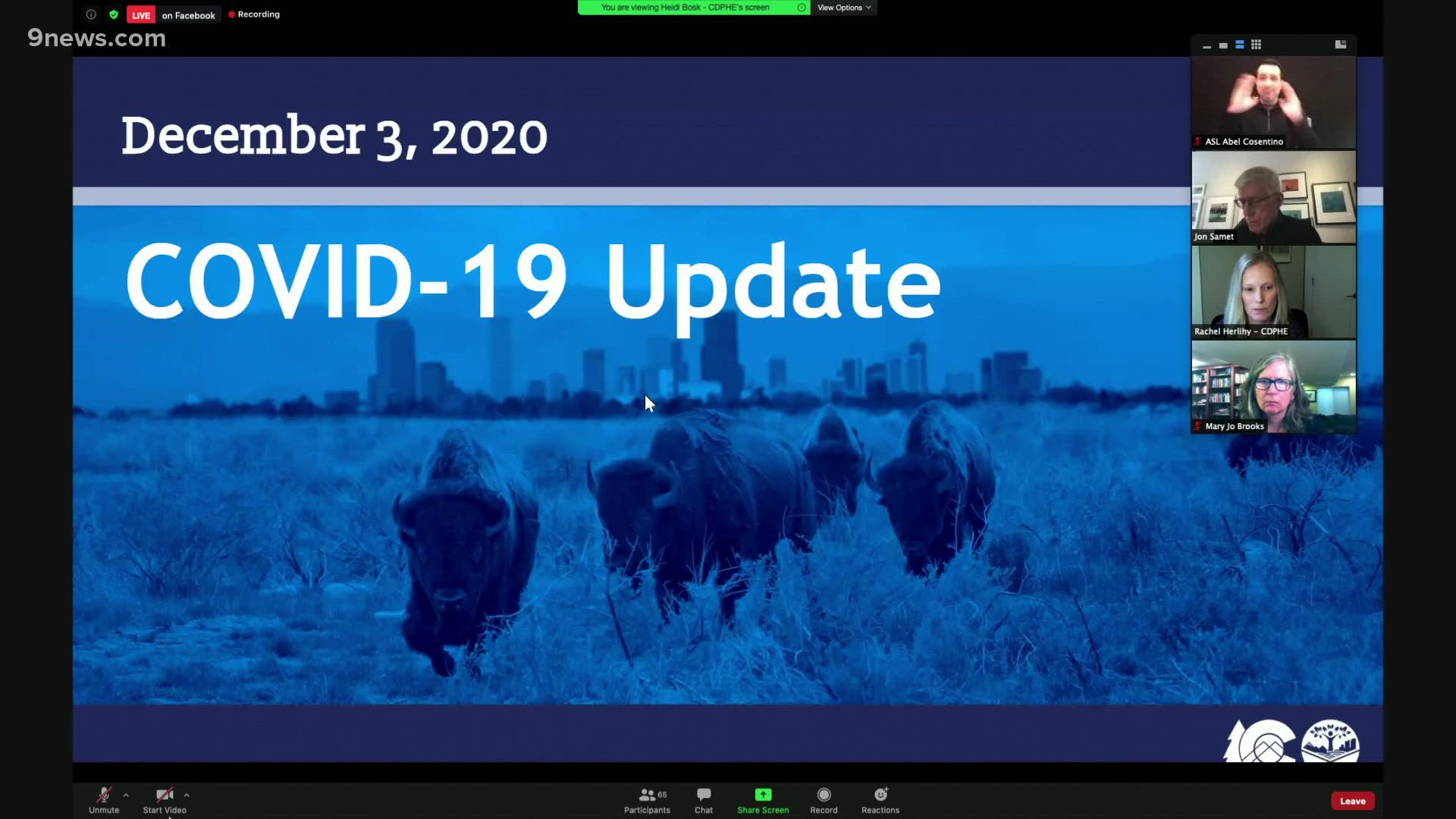DENVER — While a lot is still unknown about reinfection and immunity related to COVID-19, state health officials on Thursday acknowledged that 300 people in Colorado have tested positive for the novel virus twice.
“We have observed I think around 300 of those instances here in the state of individuals who had a previous positive test and then tested positive again," Dr. Rachel Herlihy an epidemiologist with the Colorado Department of Public Health and Environment (CDPHE). “I think there’s, unfortunately, lots of things we still don’t know about reinfection with this virus.”
Herlihy made the comment during a briefing Thursday alongside Dr. Jon Samet from the Colorado School of Public Health. According to Samet, health officials estimate that to date between 16 and 17% of Coloradans have been infected with the virus. He said while that amount is "significant" it's nowhere near what would be needed to reach herd immunity.
One in 40 people in the state is currently infectious, officials said. Models also show it's possible we could see an additional 2,000 deaths due to COVID-19 by the end of the year.
"Given the fact that we've experienced rising cases and hospitalizations, there's no doubt that the numbers of deaths will rise," said Samet. "I hope that our numbers are an overestimate but I think we're facing a number of deaths that is far greater than we would like to experience."
Thursday's call comes a week after Thanksgiving and Herlihy said the first data to show an impact from the holiday will start around Dec. 7 but we likely won't see the full impact until some time later next week.
"We're certainly hoping we're not going to see a significant increase in the number of cases in the state following the holiday but we know that is is certainly possible," she said.
Herlihy also said they work with the Colorado Department of Transportation(CDOT) to monitor travel through their cameras. She said it appeared that travel to the high country was down by about 27% over the holiday compared to 2019.
While data surrounding the number of cases, hospitalizations and the positivity rate have been rising, the reproductive number which represents the average number of people that can be infected from one person dipped slightly. It fell to 1.2 from the peak value of nearly 1.7. Ideally, the reproductive number should be below one to slow the virus spread.
Currently, transmission control is at about 71%, according to Samet, who said ideally it should be at 80%. With the holidays ahead he said it's unlikely we'll reach that threshold and could move in the wrong direction.
"The point here is we need to be maintaining as high a level of transmission control as possible particularly when these likely holiday mixing, increased mixing is superimposed on where we are now, not have the R-value below one," said Samet.
Herlihy said the state recommends the following:
- To cancel gatherings with people not in their household ( including any holiday gatherings)
- Wear a mask if outside of the home
- Stay at least six feet from others
Herlihy also touched on new options from the Centers for Disease Control and Prevention regarding quarantine. She stressed that the 14-day quarantine is still the "gold standard" but said in some cases the quarantine period following an exposure could be reduced to seven or 10 days.
Even if they have stopped quarantine people should monitor for the symptoms for the full 14 days.
"We know that under these shortened quarantine scenarios, there are going to be a small percentage of people that could potentially go on to develop infection," Herlihy said.
Earlier his week, Dr. Anthony Fauci, the nation's top infectious disease expert, joined Gov. Jared Polis (D-Colorado) for a briefing.
"The numbers were already going up," he said. "Instead of thinking in terms of the Thanksgiving holiday, and then the Christmas holiday as two separate events, I think we're going to be looking at 30 or more days of a period of time of precarious risk."
Hospitalizations related to the novel coronavirus have reached nearly 1,900, according to the latest numbers from CDPHE.
The seven-day, moving average positivity rate increased to 11.9%, according to CDPHE, which is well above the World Health Organization (WHO) recommendation that the positivity rate be at or below 5% to contain the virus.
On Wednesday the Colorado Legislature wrapped up a three-day special session during which several bills were passed to provide relief during the ongoing pandemic.
SUGGESTED VIDEOS: COVID-19 Coronavirus


